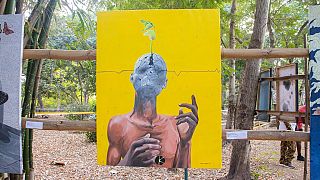Youth
The future looked promising for Tinashe Mapuranga, an intern at a leading bank in Zimbabwe who appeared set to get a staff position as soon as he completed his college degree.
Then the COVID-19 pandemic hit.
Amid the lockdowns, the 24-year-old was one of the first to be laid off and has no idea when he'll be able to get his degree because of frequent school closures.
Mapuranga spends most of his time at home, tending a tiny vegetable garden that is the family's main source of food.
His mother ekes out a living traveling to South Africa to sell things like stone carvings and brooms on the streets, a trade also badly hit by the pandemic.
Mapuranga's situation might look dire, but he says he's concerned about some of his unemployed peers who have fallen into alcohol, drugs and prostitution.
Across Africa, many others like Mapuranga are battling the economic downturn caused by COVID-19, losing jobs and seeing their education disrupted, a survey of people aged 18-24 in 15 countries has found.
The pandemic increased the already-high level of unemployment among the group, according to preliminary findings of the second annual Africa Youth Survey.
Nearly 20% of the 4,500 respondents said they became unemployed because of the pandemic and 37% were forced to stop or pause their education.
Another 8% saw their pay docked, 18% had to move back home and 10% said they had to care for family members, according to the survey, which was commissioned by the Johannesburg-based Ichikowitz Family Foundation.
"So the survey found that a significant percentage of the youth polled who had jobs had either lost their jobs or had their salaries docked or had lost income," the founadtion's founder, Ivor Ichikowitz, said.
Of the 1.3 billion people in Africa's 54 countries, an estimated 250 million are aged 18-24.
People surveyed said the pandemic caused substantial disruptions to their schooling, emphasizing the need for more computers and internet access in Africa for online education.
"Last year I didn't even learn," said Zimbabwian student Tadiswa Zhemero.
"I only learnt for one month and it really affected me."
She said not only had the pandemic affected her studies but it had also impacted on her family's income with both her parents jobs affected.
In 2020, about 40% of those surveyed expressed optimism about the future.
The pandemic dented that confidence, lowering it to 31%, according to the survey.
***AP***











01:05
Brazilian police indict Bolsonaro for alleged attempted coup, threatening his political career
01:16
Kenya investigates alleged abduction in Nairobi of Uganda opposition figure
01:33
Botswana goes to the polls as the country faces economic challenges
Go to video
5,000 Kenyans stranded and jobless in Qatar, says labour CS Mutua
Go to video
Africans recruited for Russian jobs say they were tricked into building Ukraine drones
01:40
Young Tunisians disillusioned by economy, pace of change